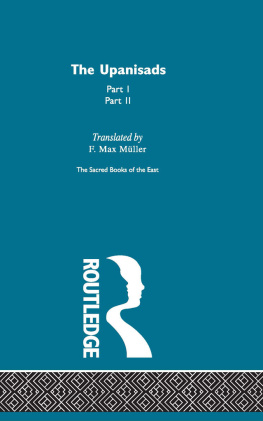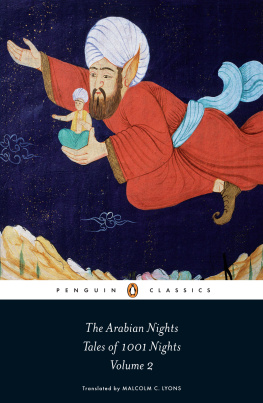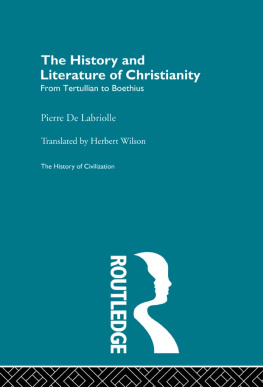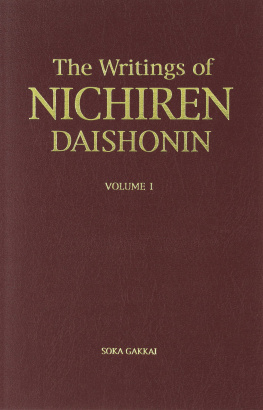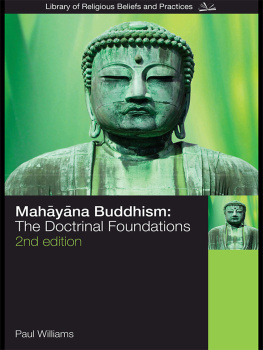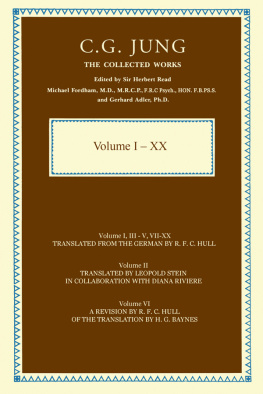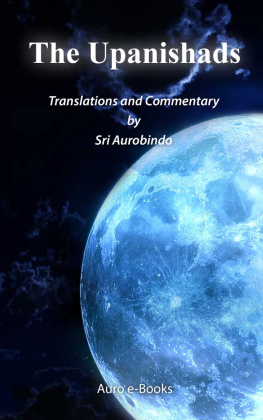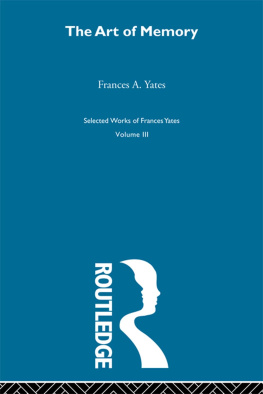THE
SACRED BOOKS
OF THE EAST
Volume 1
Volume 15

First published 1895-1910 by Curzon Press
This Edition published in 2001 by Routledge
2 Park Square, Milton Park, Abingdon, Oxon OX14 4RN
711 Third Avenue, New York, NY 10017
Routledge is an imprint of the Taylor & Francis Group, an informa business
All rights reserved. No part of this book may be reprinted or reproduced or utilised in any form or by any electronic, mechanical, or other means, now known or hereafter invented, including photocopying and recording, or in any information storage or retrieval system, without permission in writing from the publisher.
ISBN: 9780700706006 The Sacred Books of the East, Volumes 1-50
9780700715404 The Upanisads, Parts I and II
9780415409858 Part I
9780415409865 Part II
9781136864490 epub
These reprints are taken from original copies of each book. In many cases the condition of those originals is not perfect, pages having suffered from such things as inconsistent printing pressures, show-through from one side of a leaf to the other, the filling in of some letters and characters, unstable, often handmade, paper and the break -up of type. The publisher has gone to great lengths to ensure the quality of these reprints but points out that certain characteristics of the original copies will, of necessity, be apparent in reprints therof.
CONTENTS.
Part I
Part II
I MUST begin this series of translations of the Sacred Books of the East with three cautions:the first, referring to the character of the original texts here translated; the second, with regard to the difficulties in making a proper use of translations; the third, showing what is possible and what is impossible in rendering ancient thought into modern speech.
Readers who have been led to believe that the Vedas of the ancient Brahmans, the Avesta of the Zoroastrians, the Tripitaka of the Buddhists, the Kings of Confucius, or the Koran of Mohammed are books full of primeval wisdom and religious enthusiasm, or at least of sound and simple moral teaching, will be disappointed on consulting these volumes. Looking at many of the books that have lately been published on the religions of the ancient world, I do not wonder that such a belief should have been raised; but I have long felt that it was high time to dispel such illusions, and to place the study of the ancient religions of the world on a more real and sound, on a more truly historical basis. It is but natural that those who write on ancient religions, and who have studied them from translations only, not from original documents, should have had eyes for their bright rather than for their dark sides. The former absorb all the attention of the student, the latter, as they teach nothing, seem hardly to deserve any notice. Scholars also who have devoted their life either to the editing of the original texts or to the careful interpretation of some of the sacred books, are more inclined, after they have disinterred from a heap of rubbish some solitary fragments of pure gold, to exhibit these treasures only than to display all the refuse from which they had to extract them. I do not blame them for this, perhaps I should feel that I was open to the same blame myself, for it is but natural that scholars in their joy at finding one or two fragrant fruits or flowers should gladly forget the brambles and thorns that had to be thrown aside in the course of their search.
But whether I am myself one of the guilty or not, I cannot help calling attention to the real mischief that has been done and is still being done by the enthusiasm of those pioneers who have opened the first avenues through the bewildering forest of the sacred literature of the East. They have raised expectations that cannot be fulfilled, fears also that, as will be easily seen, are unfounded. Anyhow they have removed the study of religion from that wholesome and matter-of-fact atmosphere in which alone it can produce valuable and permanent results.
The time has come when the study of the ancient religions of mankind must be approached in a different, in a less enthusiastic, and more discriminating, in fact, in a more scholarlike spirit. Not that I object to dilettanti, if they only are what by their name they profess to be, devoted lovers, and not mere amateurs. The religions of antiquity must always be approached in a loving spirit, and the dry and cold-blooded scholar is likely to do here as much mischief as the enthusiastic sciolist. But true love does not ignore all faults and failings: on the contrary, it scans them keenly, though only in order to be able to understand, to explain, and thus to excuse them. To watch in the Sacred Books of the East the dawn of the religious consciousness of man, must always remain one of the most inspiring and hallowing sights in the whole history of the world; and he whose heart cannot quiver with the first quivering rays of human thought and human faith, as revealed in those ancient documents, is, in his own way, as unfit for these studies as, from another side, the man who shrinks from copying and collating ancient MSS., or toiling through volumes of tedious commentary. What we want here, as everywhere else, is the truth, and the whole truth; and if the whole truth must be told, it is that, however radiant the dawn of religious thought, it is not without its dark clouds, its chilling colds, its noxious vapours. Whoever does not know these, or would hide them from his own sight and from the sight of others, does not know and can never understand the real toil and travail of the human heart in its first religious aspirations; and not knowing its toil and travail, can never know the intensity of its triumphs and its joys.
In order to have a solid foundation for a comparative study of the religions of the East, we must have before all things complete and thoroughly faithful translations of their sacred books. Extracts will no longer suffice. We do not know Germany, if we know the Rhine; nor Rome, when we have admired St. Peters. No one who collects and publishes such extracts can resist, no one at all events, so far as I know, has ever resisted, the temptation of giving what is beautiful, or it may be what is strange and startling, and leaving out what is commonplace, tedious, or it may be repulsive, or, lastly, what is difficult to construe and to understand. We must face the problem in its completeness, and I confess it has been for many years a problem to me, aye, and to a great extent is so still, how the Sacred Books of the East should, by the side of so much that is fresh, natural, simple, beautiful, and true, contain so much that is not only unmeaning, artificial, and silly, but even hideous and repellent. This is a fact, and must be accounted for in some way or other.
To some minds this problem may seem to be no problem at all. To those (and I do not speak of Christians only) who look upon the sacred books of all religions except their own as necessarily the outcome of human or superhuman ignorance and depravity, the mixed nature of their contents may seem to be exactly what it ought to be, what they expected it would be. But there are other and more reverent minds who can feel a divine afflatus in the sacred books, not only of their own, but of other religions also, and to them the mixed character of some of the ancient sacred canons must always be extremely perplexing.
I can account for it to a certain extent, though not entirely to my own satisfaction. Most of the. Hence, what had been said by these half-human, half-divine ancestors, if it was preserved at all, was soon looked upon as a more than human utterance. It was received with reverence, it was never questioned and criticised.
Next page
